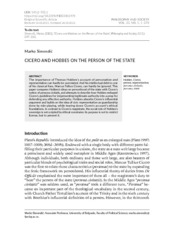Cicero and Hobbes on the Person of the State
Ciceron i Hobs o ličnosti države
Чланак у часопису (Објављена верзија)
Метаподаци
Приказ свих података о документуАпстракт
The importance of Thomas Hobbes’s account of personation and representation can hardly be overstated. And his intellectual debt to one of his classical foes, Marcus Tullius Cicero, can hardly be ignored. This paper compares Hobbes’s ideas on personhood of the state with Cicero’s notion of persona civitatis, and attempts to describe how Hobbes reshaped Cicero’s guidelines for (re)presenting legitimate authority into a prop for defending any effective authority. Hobbes absorbs Cicero’s influential argument and builds on the idea of civic representation as guardianship done by role-playing, while tearing down Cicero’s account’s ethical foundations. In contrast to Cicero’s magistrate, the social role of Hobbes’s sovereign is not scripted by ethical constrains: its purpose is not to restrict license, but to present it.
Teško je prenaglasiti važnost ideja Tomasa Hobsa o licu, ličnosti i predstavljaju. Takođe, teško je zanemariti dug koji u ovom pogledu Hobs ima prema jednom od svojih klasičnih suparnika, Marku Tuliju Ciceronu. U ovom radu poredim Hobsove ideje o ličnosti države sa Ciceronovim pojmom persone civitatis i nastojim da opišem kako je Hobs oblikovao Ciceronova uputstva za predstavljanje legitimne vladavine u mehanizam za odbranu bilo kakve efektivne vladavine. Hobs apsorbuje Ciceronovu uticajnu argumentaciju i razvija njegovu ideju političkog predstavljanja kao uloge i jedne vrste starateljstva, pri čemu uklanja etičke temelje Ciceronove teorije. Za razliku od uloge Ciceronovog magistrata, društvena uloga Hobsovog suverena nije uslovljena etičkim ograničenjima: njena svrha nije da ublaži samovolju dužnosnika već da joj pruži opravdanje.
Кључне речи:
Hobbes / Cicero / person / representation / persona civitatis / persona / stateИзвор:
Filozofija i društvo / Philosophy and Society, 2022, 33, 1, 247-262Издавач:
- Beograd : Institut za filozofiju i društvenu teoriju
URI
https://journal.instifdt.bg.ac.rs/index.php/fid/article/view/1441http://rifdt.instifdt.bg.ac.rs/123456789/2542
Институција/група
IFDTTY - JOUR AU - Simendić, Marko PY - 2022 UR - https://journal.instifdt.bg.ac.rs/index.php/fid/article/view/1441 UR - http://rifdt.instifdt.bg.ac.rs/123456789/2542 AB - The importance of Thomas Hobbes’s account of personation and representation can hardly be overstated. And his intellectual debt to one of his classical foes, Marcus Tullius Cicero, can hardly be ignored. This paper compares Hobbes’s ideas on personhood of the state with Cicero’s notion of persona civitatis, and attempts to describe how Hobbes reshaped Cicero’s guidelines for (re)presenting legitimate authority into a prop for defending any effective authority. Hobbes absorbs Cicero’s influential argument and builds on the idea of civic representation as guardianship done by role-playing, while tearing down Cicero’s account’s ethical foundations. In contrast to Cicero’s magistrate, the social role of Hobbes’s sovereign is not scripted by ethical constrains: its purpose is not to restrict license, but to present it. AB - Teško je prenaglasiti važnost ideja Tomasa Hobsa o licu, ličnosti i predstavljaju. Takođe, teško je zanemariti dug koji u ovom pogledu Hobs ima prema jednom od svojih klasičnih suparnika, Marku Tuliju Ciceronu. U ovom radu poredim Hobsove ideje o ličnosti države sa Ciceronovim pojmom persone civitatis i nastojim da opišem kako je Hobs oblikovao Ciceronova uputstva za predstavljanje legitimne vladavine u mehanizam za odbranu bilo kakve efektivne vladavine. Hobs apsorbuje Ciceronovu uticajnu argumentaciju i razvija njegovu ideju političkog predstavljanja kao uloge i jedne vrste starateljstva, pri čemu uklanja etičke temelje Ciceronove teorije. Za razliku od uloge Ciceronovog magistrata, društvena uloga Hobsovog suverena nije uslovljena etičkim ograničenjima: njena svrha nije da ublaži samovolju dužnosnika već da joj pruži opravdanje. PB - Beograd : Institut za filozofiju i društvenu teoriju T2 - Filozofija i društvo / Philosophy and Society T1 - Cicero and Hobbes on the Person of the State T1 - Ciceron i Hobs o ličnosti države IS - 1 VL - 33 SP - 247 EP - 262 DO - 10.2298/FID2201247S%20 ER -
@article{
author = "Simendić, Marko",
year = "2022",
abstract = "The importance of Thomas Hobbes’s account of personation and representation can hardly be overstated. And his intellectual debt to one of his classical foes, Marcus Tullius Cicero, can hardly be ignored. This paper compares Hobbes’s ideas on personhood of the state with Cicero’s notion of persona civitatis, and attempts to describe how Hobbes reshaped Cicero’s guidelines for (re)presenting legitimate authority into a prop for defending any effective authority. Hobbes absorbs Cicero’s influential argument and builds on the idea of civic representation as guardianship done by role-playing, while tearing down Cicero’s account’s ethical foundations. In contrast to Cicero’s magistrate, the social role of Hobbes’s sovereign is not scripted by ethical constrains: its purpose is not to restrict license, but to present it., Teško je prenaglasiti važnost ideja Tomasa Hobsa o licu, ličnosti i predstavljaju. Takođe, teško je zanemariti dug koji u ovom pogledu Hobs ima prema jednom od svojih klasičnih suparnika, Marku Tuliju Ciceronu. U ovom radu poredim Hobsove ideje o ličnosti države sa Ciceronovim pojmom persone civitatis i nastojim da opišem kako je Hobs oblikovao Ciceronova uputstva za predstavljanje legitimne vladavine u mehanizam za odbranu bilo kakve efektivne vladavine. Hobs apsorbuje Ciceronovu uticajnu argumentaciju i razvija njegovu ideju političkog predstavljanja kao uloge i jedne vrste starateljstva, pri čemu uklanja etičke temelje Ciceronove teorije. Za razliku od uloge Ciceronovog magistrata, društvena uloga Hobsovog suverena nije uslovljena etičkim ograničenjima: njena svrha nije da ublaži samovolju dužnosnika već da joj pruži opravdanje.",
publisher = "Beograd : Institut za filozofiju i društvenu teoriju",
journal = "Filozofija i društvo / Philosophy and Society",
title = "Cicero and Hobbes on the Person of the State, Ciceron i Hobs o ličnosti države",
number = "1",
volume = "33",
pages = "247-262",
doi = "10.2298/FID2201247S%20"
}
Simendić, M.. (2022). Cicero and Hobbes on the Person of the State. in Filozofija i društvo / Philosophy and Society Beograd : Institut za filozofiju i društvenu teoriju., 33(1), 247-262. https://doi.org/10.2298/FID2201247S%20
Simendić M. Cicero and Hobbes on the Person of the State. in Filozofija i društvo / Philosophy and Society. 2022;33(1):247-262. doi:10.2298/FID2201247S%20 .
Simendić, Marko, "Cicero and Hobbes on the Person of the State" in Filozofija i društvo / Philosophy and Society, 33, no. 1 (2022):247-262, https://doi.org/10.2298/FID2201247S%20 . .


